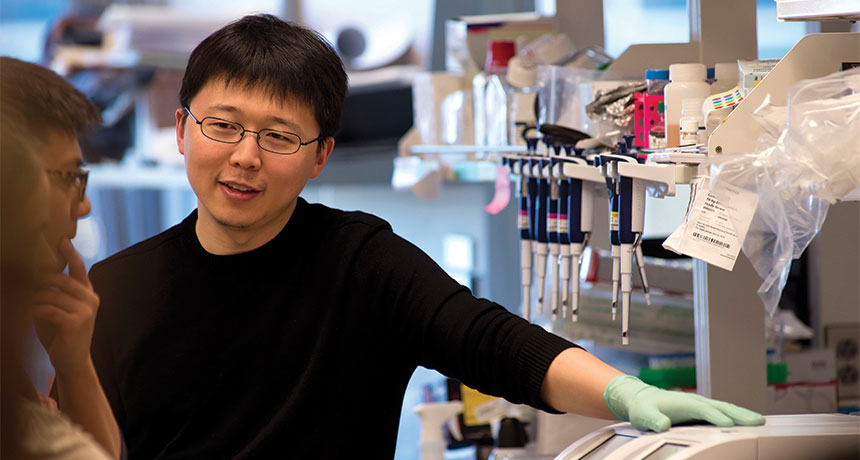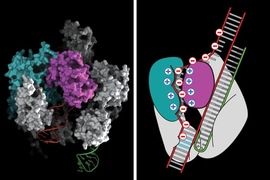

He published a pivotal paper in the journal Science, alongside another seminal article led by Harvard's George Church, in early 2013. Other scientists worked on CRISPR as well, but Zhang was first to develop CRISPR to edit genes in animal and plant cells. He and others found a way to take a sort of a molecular scissors that existed in nature and engineer it into something incredibly useful to humans: a way to edit genes that's so much easier, it's like going from pen and paper to word processing. "So when he looks at a new bacteria or some biological process, he says, 'Wow, that's so neat! How can I make use of that? How does it work? How might I deploy it?' " He has kept the ability to be fascinated by everything.

"Feng looks around the natural world in a way that you might call almost childlike. Zhang "is so amazingly creative because he's infinitely curious," says Eric Lander, director of the Broad Institute in Cambridge. 'That's So Neat! How Can I Make Use Of That?' Zhang "knew a lot about viruses and knew molecular biology," Boyden says, "and pretty soon he was putting these molecules into viral vectors, and we were putting them into the living brain, and sure enough, it worked!" Zhang set out to make viruses that could deliver optogenetics into the brains of living mice, so that by using light to turn their neural circuits on and off, scientists could see how it affected their behavior: They could see what those circuits do. MIT professor Ed Boyden recalls that the method was working in neurons in a dish. There, he helped develop a game-changing brain science tool - optogenetics, which lets researchers control neurons with light to figure out more about how the brain works.
#Feng zhang mit dna master editor full#
Zhang went to Harvard on full scholarship and then to Stanford for grad school. He would spend late hours in the lab, and just the light in his eyes when he would make a new discovery."

"It became discovery, and he had a real passion for that. "It became not just new learning for him," Pilkington says.

Zhang realized "that you can actually build biological things that can help people," he says. That green-glowing cell was part of the gene therapy lab's effort to find new treatments for cancer. "One of the very first experiments I did was to put a green fluorescent protein into a cell, and then the cell glowed green," he recalls. "Not everybody is able to fail 20 experiments and then get up and then come up with something brilliant." Former science teacher Ed Pilkington, Zhang's mentor in Iowa It was about controlling the molecules of life itself. Biology was no longer about memorization and smelly dissection frogs. So with Pilkington's help, he volunteered at age 16 at a local gene therapy lab. Zhang was soon ready for more than just classroom science. Not everybody is able to fail 20 experiments and then get up and then come up with something brilliant." I've seen students that test better than him. Zhang wasn't just highly intelligent, Pilkington says he had unstoppable drive, "and that's unique. But he quickly impressed Ed Pilkington, a former science teacher who coordinated the high school gifted and talented program. Zhang didn't speak any English when his mother first brought him to Des Moines, Iowa, in 1993. "Because I like to take things apart and break things," Zhang says, "and it would be better for me to be in a system where I'm not so confined to a specific type of learning." When Feng Zhang - pronounced Fuhng Jahng - was 11 years old, his parents, both computer scientists, decided the American style of education would work better for him than the schools in China. MIT's Zhang, who is based at the Broad Institute in Cambridge and the McGovern, is a scientist who says he wants to change the world. Those discoveries include work on two major advances: one in brain science, and CRISPR, the breakthrough method for editing genes. "And by seeing those new connections, he’s able to make these gigantic new discoveries." "Feng is a one-in-a-generation scientist who sees connections that the rest of us have overlooked," says Robert Desimone, director of the McGovern Institute for Brain Research at MIT. Possibly the most famous Boston-area scientist you've never heard of is named Feng Zhang.īy any measure - papers, prizes, impact - Zhang is a science superstar, one of the most inventive life scientists in the world. Feng Zhang, in a 2015 file photo (Susan Walsh/AP) This article is more than 3 years old.


 0 kommentar(er)
0 kommentar(er)
